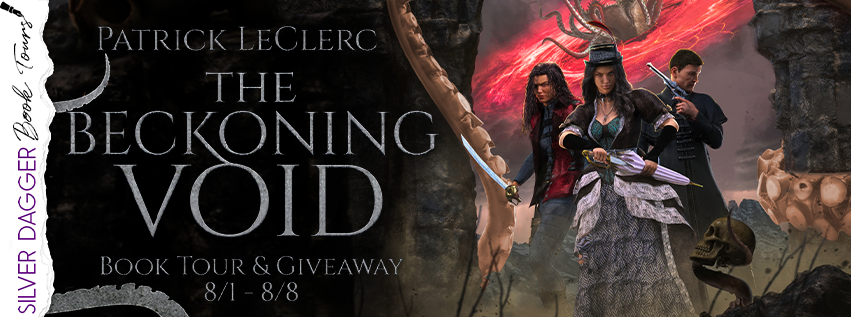The Beckoning Void a Gaslamp Adventure Horror by Patrick LeClerc ➱ Book Tour with Guest Post & Giveaway
Can Emelia and her band of plucky outcasts save the world from a cult of fanatics intent on unleashing an ancient horror?
The Beckoning Void
by Patrick LeClerc
Genre: Gaslamp Adventure Horror
Emelia DuMond is an actress, her skill at adopting and changing her identity lifting her from her humble beginnings to success on the stage of Victorian London. And to the attention of the Ghost Society, a secret organization who work to defend the world from threats of the paranormal. After centuries of seeking, the sinister Disciples of the Void have obtained an arcane book of great power. A power that could tear the veil between dimensions and plunge the world into a dark, unspeakable future.
Now she has recruited an aging soldier of fortune burdened by a conscience, the sword wielding daughter of an Afghan brigand and an airship whose captain escaped slavery during the Civil War by stealing a Confederate vessel.
Can Emelia and her band of plucky outcasts save the world from a cult of fanatics intent on unleashing an ancient horror?
“The Beckoning Void” is a tale of cunning plots, flashing swords, skillful piloting, witty repartee and eldritch dread.
** Recently made it into the semi-finals of the 2023 Book Blogger Novel of the Year Award! Details can be found at https://www.bbnya.com/ OR on Twitter at @BBNYA_Official **
It did not take long
for the two new bodyguards to gather their belongings and meet Emelia at the Phoenix.
After they had seen the ship and been shown their berths, MacGregor invited
them all for a drink at the big table in the wardroom. As they took their
seats, he reverently opened a new bottle of whisky.
“Not hoarding the
good stuff for yourself?” asked Connolly.
“Figured you
deserved a dram since I won it betting on you.”
“Trading on inside
information?” said Connolly, accepting the offered glass.
“Having knowledge
and failing to use it goes against every principle of engineering. At that
point, you may as well just be a scientist.”
“Where do you two
know one another from?” Emelia asked. “I know you said you met in the army, but
there must be a story there.”
“We met in India. On
the Northwest Frontier. Near Afghanistan,” said MacGregor.
“Long time ago,”
added Connolly. “Twenty years?”
“Twenty-five.”
“Jesus.”
“I was in the Royal
Engineers, doing aerial surveying and building bridges in that godforsaken country.
Connolly here had a Company commission. Led a troop of irregular cavalry.”
“Like leading Ali
Baba’s Forty Thieves,” Connolly smiled. “First class scouts, damn fine
horsemen. Thieves to the bone. Steal the horse from under your saddle if you
looked away. God, I miss ‘em.”
Alyah studied his
face. “Khan Ali?” she said.
“What?” Connolly
asked.
“You are Khan Ali?”
Connolly let out a
laugh. “That’s what my men called me. Closest they could get to ‘Connolly.’
How’d you know that?”
“I think you met my
father.”
“Age is a hell of a
thing.” He shook his head. “Was he one of my cutthroats?”
“One of the
cutthroats on the other side,” she said with a wide grin. “I think you have him
to thank for that scar.”
“Really?” drawled
MacGregor. “That’s a tale, now.”
“I did get that from
some brigand with a tulwar,” said Connolly, rubbing a scar above his right
eyebrow. “That bastard was your father?”
“He always bragged
he struck down the great Khan Ali,” Alyah replied. “Now I know his boast has
some substance.”
“He didn’t strike me
down. We crossed swords, and he got the better of it. I killed two of his
fellows that day before he and I fought.”
“He credited you
with ten,” she said. “Before he defeated you.”
“It was only two.
And he didn’t defeat me, he cut me. And escaped. I’d have caught
him if it wasn’t for the blood running into my eyes.”
“It seems the young
lady takes after her father,” said the engineer.
“If he’d been half
as good as she is, I’d be dead,” said Connolly.
“So your father was
an Afghan brigand?” asked Emelia, turning her curiosity on the other woman.
“Could be worse,”
said MacGregor. “Could have been a Tory MP or a railroad baron.”
Emelia
The crowded Theatre
Royal Adelphi erupted in applause. Emelia DuMond curtseyed deeply as the
curtain descended, basking in the adoration of the audience. She was born for
this.
No, she corrected
herself. She was reborn for it. Emma O’Grady had been born to scrub
floors and take in laundry. But once she had shed that husk, Emelia had sprung
forth fully formed, like Athena from the head of Zeus. Witty, sophisticated,
and charming. Able to change emotions like costumes, and, more importantly, to
evoke those emotions in others. She had discovered a talent for imitation,
making the other laundry girls laugh at her impressions of the wealthy clients,
and saw in that talent a way out of poverty. She observed and perfected
mannerism and accents and learned the secrets that the upper class spoke freely
in her presence, taking no more notice of servants than of furniture.
As she made her way
to the wings, a stagehand spoke to her. “Mister Dickens wishes to see you,
miss.”
“Thank you,
William,” she replied. She wondered what Charles could want. It was unusual for
him to call on her at a show. Especially one he hadn’t written. Nor was it
opening night or some other occasion where he could be expected to congratulate
her. They had known one another for some time, as he was a patron of the
theater, but eventually their relationship had come to revolve more around his
other passion: the occult.
She opened the door
of her dressing room and found the author standing stiffly, fidgeting with the
top hat in his hands.
“Charles,” she said
with a radiant smile, giving the man a kiss on his cheek. “To what do I owe the
pleasure of your visit?”
“Emelia, my dear,”
he replied. “I’ve come on behalf of the Society. It is a matter of grave
concern.”
“Sit, Charles,
please,” she said, dropping onto a stool. “And please, do unburden yourself of
this urgent matter.” Her smile took on a wry twist. “It must be truly dire for
you to forget to compliment my performance.”
The man reddened.
She knew how highly he valued propriety and manners, and for a gentleman to
show up in the dressing room of an actress without a gift or even flattery was
not the done thing. Behind her amused smile she felt a quiver of concern.
“I apologize, my
dear. I forget myself. You were stunning, as always.”
“You are too kind.”
“But let me offer a
sorry excuse for my haste. Dr Carmody is in hospital in Vienna. He was
attacked. Worse even than that, he was in possession of a book which was
stolen. A book of great eldritch power. I can only assume it is in dangerous
hands.”
Emelia’s smile
vanished. “There’s no chance this was random coincidence? A mundane robbery?”
Dickens shook his
head. “Nothing else was taken. Whoever attacked him knew what they were after.
And he was distracted.”
“Distracted?”
The author shifted
uncomfortably. “Yes. It seems that there was a woman.”
“Dr Carmody was
robbed by a woman?” she asked with an incredulous smile.
“By her accomplice.
The woman was a wh—a lady of easy virtue. Probably didn’t know anything of the
book or the plan. Just used to cloud his judgment while he was set upon.”
Dickens began to twist his hat in his hands, then realized what he was doing
and set it down on her dressing table with care. “I’m surprised the doctor was
taken off guard. The man is normally a committed professional.”
“I’m sure the young
lady was skilled in distraction,” Emelia replied. “And many committed,
professional men tend to underestimate a pretty young woman and lower their
guard.”
“A mistake I hope
never to make with you, my dear.”
“What would you have
me do?”
“You’ve a talent for
investigation, and, as a celebrated actress, the perfect cover. I’d like you to
go to Vienna and see what you can discover.” He handed over a packet. “Here are
letters of introduction to the proprietors of several theaters in Vienna, as
well as money and bank drafts should you need more. I would suggest you hire an
airship and a pair of bodyguards and use the rest to loosen lips.”
“Did Dr Carmody tell
you the name the young lady gave him?”
“No,” said Dickens.
“I think he was embarrassed at the whole affair and didn’t think it important.
Why?”
“Well, the name she
gave is probably an alias, but it’s a thread to pick at. A place to start. If
she was hired to distract him, she might know who hired her. And she might be
willing to divulge that information for money.”
“You think so?”
Roderick
The slanting rays of
the setting sun poured in through gaps in the rotted shutters of the ancient
cottage, illuminating swirling eddies of dust. The fireplace was cold. Part of
the thatched roof had fallen in. A scatter of leaves skittered across the floor
as a breeze found its way around the warped door.
Count Roderick sat
on a rickety chair in the dimly lit hovel, sizing up the three men opposite
him. Rough men. Dressed like brigands, but with a very unbrigand-like sense of
purpose about them. Each of them had a hanger or messer and a hefty dagger at
his belt, and two had long pistols at their sides. That didn’t concern Roderick
overly. For his own part, he wore his sabre at his left hip and a revolver at
his right. The count felt that the naked display of weapons might serve to
discourage violence. He also had a dagger up his sleeve and a derringer in the
pocket of his jacket, in the event he was asked to remove his weapons to
demonstrate his peaceful intent. Demonstration was a fine thing, he believed, and
his intent was generally peaceful, but flexible.
It was the eyes of
the men that concerned him. Hard eyes. Not the cold, hard eyes of a murderer,
but the kind of hard eyes that burned with the flames of a fanatic. Dangerous
men.
But they were
dangerous men with money, and he had debts. Pity the elder count hadn’t been
granted the sense to run an estate. The man had been a gifted soldier, skilled
with a horse or a sword or a pistol, and with an eye for ground, a head for
tactics, and a way of commanding men.
That much had earned
him a title from the Emperor of Austria-Hungary. But for all his sterling
qualities, he had a blind spot for money and a mercenary’s devil may care
attitude toward tomorrow. Couple that with a rapacious appetite for fast
horses, beautiful women, drink and cards and the end result was that when he
died, he left his estate—and therefore his son—in debt up to his eyeballs.
Roderick didn’t
really blame his father. The man had been a simple soldier who had landed
unexpectedly in luxury and took full advantage of it. He’d have done the same.
Probably could have in different times, for he had inherited his father’s
charisma and martial prowess. The young man, however, had the misfortune to be
born into a period of peace.
So here he was, conducting
clandestine meetings with shady, probably mad cultists in a cold, drafty
cottage instead of attending victory balls in Vienna.
“You have the book?”
asked the first ruffian. A lanky fellow with a face like a corpse but not as
joyful.
“I do.” Roderick
reached into his satchel and handed it over.
In truth, he was
glad to be rid of it. The thing made his flesh crawl. It was old, filled with
symbols and scribbles in some language he couldn’t read but found disquieting.
The leather binding reminded him of human skin and the ink was the rusty brown
of old blood. He told himself that this was just silly superstition. That he
was a man of reason living in an enlightened age, but the blood of an Irish
father and Romani mother provided fertile soil for the seeds of eldritch horror
to take root.
The cultist leaned
over it, the fire in his eyes burning hotter. He reached out and touched the
spine, tentatively but with restrained desire, stroking it with a trembling
hand. The others peered over his shoulder.
Like virgins on
their first visit to a brothel, thought Roderick.
“I’m impressed,”
said the leader. He placed a purse upon the table. “I’d have thought Dr Carmody
would have defended this with his life. And was ever vigilant.”
The count shrugged.
“I enlisted the help of a lass I know who excels in distracting even the most
vigilant of men. And making them much less capable of defense.” He looked into
the purse and frowned. “This is half what we discussed. I did bring you the
whole book. I’m fairly certain of that.”
“When our leader
receives it, the rest of your payment will be sent to you.”
Count Roderick’s
frown deepened. That wasn’t the agreement. He considered the situation and
figured that the reduced payment had a great deal to do with the fact that they
had more weapons than he did. The fact that they were willing to hand over any
payment at all was likely because he had enough weapons to make completely
stiffing him not worth the risk.
He thought for a
long moment. Accepting such treatment was bad for business. On the other hand,
they did have him outnumbered three to one, even though the one was him, which
he figured brought the odds pretty close to dead even. Still, even a fair fight
was something best avoided until you could find a way to make it unfair in your
favor.
He was still
debating with himself when the corpse-faced man interrupted his train of
thought.
“This woman. If she
knows of our plan, she must be eliminated. Unless you’ve already done so.”
That was a step too
far. The count was well aware that sometimes one couldn’t make an omelet
without murdering some witnesses, but these men grated on his nerves. They were
too direct, too sure they could impose their will on him. Him! Like so many
fanatics, they were simple blunt instruments, intent on bludgeoning the world
into the shape they wished and entirely lacking finesse. Nothing wrong with a
good old blunt instrument, when the time called for it, but he’d be damned if
he was going to be beaten into shape. And “eliminating” Margarethe would be a
criminal waste of a perfectly good prostitute with a captivating smile, a real
sense of panache, and one of nature’s finest sets of tits. May as well burn the
Sistine Chapel.
The count leaned
back in his chair, stretching his long legs and rolling his neck. His frown
disappeared, replaced by a Cheshire cat grin.
“Sorry, boys,” he
said. “I’m afraid this simply isn’t the done thing, as my dear old dad would
say. I’ll be taking that book to your boss myself, and we can discuss things
like ‘payment in full’ and ‘professional courtesy.’”
“You expect us to
agree to your terms?” said the man, his words grating like the stone door of a
tomb.
“Don’t see that the
opinions of three dead men should concern me overly.”
Why Did I choose an Alternative Victorian Era for “The
Beckoning Void?”
Mostly because it’s a mashup of all my favorite
things. History and sword fighting and adventure stories and old Hollywood
banter all rolled into one. With airships.
The Victorian Era is great story fodder. You have
enormous technological and societal changes going on, and that's really where
science fiction as we know it today was invented. Look at Mary Shelley's
“Frankenstein” (which is probably technically Georgian, not Victorian, but on
the cusp) and Edgar Allen Poe and Jules Verne and H G Wells. This is where
authors started looking at technology and asking, “What if?” which is the basis
of all science fiction.
Plus, you can still combine all that tech with swashbuckling swordfights.
In addition to the
science fiction possibilities, I wanted a
diverse, eclectic cast, and that fits the era better than people think.
Emelia was raised in poverty, but had a talent for immitation that allowed her
to find success on the stage, reinventing herslef as an actress and then a
spy. The colonialism of the age creates
the perfect circumstances for a character like Alyah. Mixed race,
Afghan-English, raised by a father who taught her swordplay and riding who
doesn't really fit into either world, so she finds her own way. The realities
of the Famine and the new mobility . Connolly and Count Roderick are both
products of the Wild Geese, Irish exiles turned soldiers in foreign armies,
albeit with varied success. Captain Little is a great character. Escaped slave
turned airship captain.
I drew inspiration for all of these characters from historical examples. None
are exact analogues, but they certainly all have precedents.
One thing they all have in common, regardless of which
side they wind up on, is that they are all outsiders. Whether due to race or
class or gender, each of them has to find their way in a world that doesn’t
accept them. The social, political, and technological upheaval of the Nineteeth
Century gave me a terrific canvas to work with.
Not to say this is a book primarily about social
issues. At its heart, it’s an action adventure swashbuckler with a touch of
horror. Think the plot of the 1999
version of “The Mummy” with the banter of
“The Princess Bride” and a dash of social commentary. Plus, a bit of mad
science and airships.
Patrick LeClerc makes good use of his history degree by working as a paramedic for an ever- changing parade of ambulance companies in the Northern suburbs of Boston. When not writing he enjoys cooking, fencing and making witty, insightful remarks with career-limiting candor.
In the lulls between runs on the ambulance --and sometimes the lulls between employment at various ambulance companies-- he writes fiction.
His work can be found at inkandbourbon.com, and quantummuse.com
Website * Facebook * Twitter * Instagram * Bookbub * Amazon * Goodreads
Follow the tour HERE for special content and a giveaway!
$10 Amazon giftcard,
Audiobook of The Beckoning Void,
ebook of The Beckoning Void
– 1 winner each!









Thanks so much for featuring my book.
ReplyDeleteThanks so much for featuring my book.
ReplyDeleteThe excerpt sounds really interesting. Thanks for sharing.
ReplyDelete